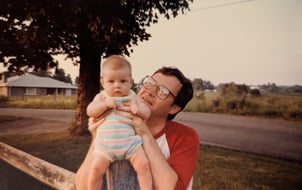A place for people who'll die...
eventually!

My name is Erin, I'm a death doula in Manchester, England. I came to this work after the sudden and unexpected death of my father, Jack. That's us there, albeit a few decades ago!
An end of life (or death) doula is a compassionate, trained person who acts as a consistent and flexible presence with knowledge, experience and understanding, to facilitate an end of life that is as peaceful, meaningful and dignified as it can be. It's a beautiful and valuable service all people should have access to at the end of their lives.
However! I believe, and have experienced, that you can live a better life when you embrace that it won't last forever... now!
It shouldn't just happen when you're given a terminal or life-limiting diagnosis.
I started The Good Mourning Society because I want to help change the way our culture lives with the practical, emotional, and spiritual parts of death. The Society is here to help you embrace what it means to live with aging, dying, death and grief - yours and your people/pets - no matter what stage in life you are.
Where do you want to start?
End of life services
I am first and foremost a practicing death doula. I'm honored to provide end of life companionship and support to people in Greater Manchester, as well as remotely around the world. I work with individuals and their people.

Mortality Moments
Embracing your mortality allows you to live a clearer, fuller, more authentic life. Join the GMS and gain access to exclusive weekly prompts, exercises, meditations and adventures that help you live now & prepare for later.

Adult children, aging parents
Where will most of us encounter aging, dying, death and grief, possibly for the first time? Our aging parents. Navigating this stage of life ain't easy, but you definitely aren't alone.

Conversation cards
Not sure how any of these conversations could start in the first place? That's why these cards were created. Connect with questions about past, present, and future.

The Good Mourning Society
Does the world you live in make aging feel like a failure?
Does the world you live in make dying terrifying and something to be hidden away or fought at all costs?
Does the world you live in accept death as a natural part of life, and provide time and space to openly talk about it?
And does your world know how to live with, and support, grief?
~~~
If these ideas feel accurate and heavy, then you're in the right place. It doesn't have to be this way, and together we can shift our world to better embrace the inevitable - we all age, we all die, we all grieve.
It's gonna happen
Would you like a long life? Not interested in dying young? Then try aging! You're a natural at it, it's just our culture that's terrible.
Living while dying
You have the right to write your last chapter, but fear of facing it means someone else may have more say with what happens than you do.
It happens to us all
It's not that we all die, it's that we'll all experience the death of people and pets we care about. How do we honor them authentically and ethically?
It's not a journey
Grief doesn't have a finish line, and no two losses are alike. In a world filled with mortal people, why does our culture make us feel so ashamed to grieve them?
Events, podcast & memorial pieces
The Good Mourning Society has lots of different ways to engage and explore what it means to be mortal in this world.
It entirely depends on where you are in life, your immediate concerns, and your capacity - but you're sure to find a path that works for you in this moment.
Events & workshops
If there's anything to take away from your visit here today, it's that you aren't alone. These topics touch each and every one of us, so let's learn, support, and change together.
Talking with Mortals
Part of normalizing aging, dying, death and grief is showing it in practice. This podcast is the perfect way to get more comfortable with these topics, while learning and laughing along the way!
Memorial pieces
Grief is not one-size-fits all, and remembering the people who've died doesn't always have to be a somber and solemn practice. This memorial art is more "celebration of life" than "funeral."
Who am I? Why am I here?
I'm Erin! I am a trained and experienced death doula and grief support worker. I am a proud member of End of Life Doula UK, and trained with Living Well Dying Well.
In addition to my work, I host a monthly Death Cafe at Hinterland Cafe and Bar. I also volunteer with a fantastic charity, The New Normal. Facilitating online and in-person (join us at Social Refuge!) peer-to-peer meetings is such a wonderful experience. I am also training with The Blue Cross to serve as a pet-loss supporter.
I'm an immigrant, an American who has made England home. I am compassionate, empathetic, creative - I swear a lot and use the darkest humor to cope with the world we find ourselves in. Yet I'm eternally optimistic and fully believe in the power we have to change, individually and together.
Most importantly, I’ve been there, in the thick of it. I carry grief, I witness loss. I’ve had to navigate the practical and emotional storm that comes with aging parents who did next to nothing to prepare for their illnesses and deaths. Like the world’s shittiest scavenger hunt, I had to search and pay and beg and blindly hope my way through situations that had simple solutions - if only my parents had planned ahead.

Contact

goodmourningsociety@gmail.com

@goodmourningsociety
